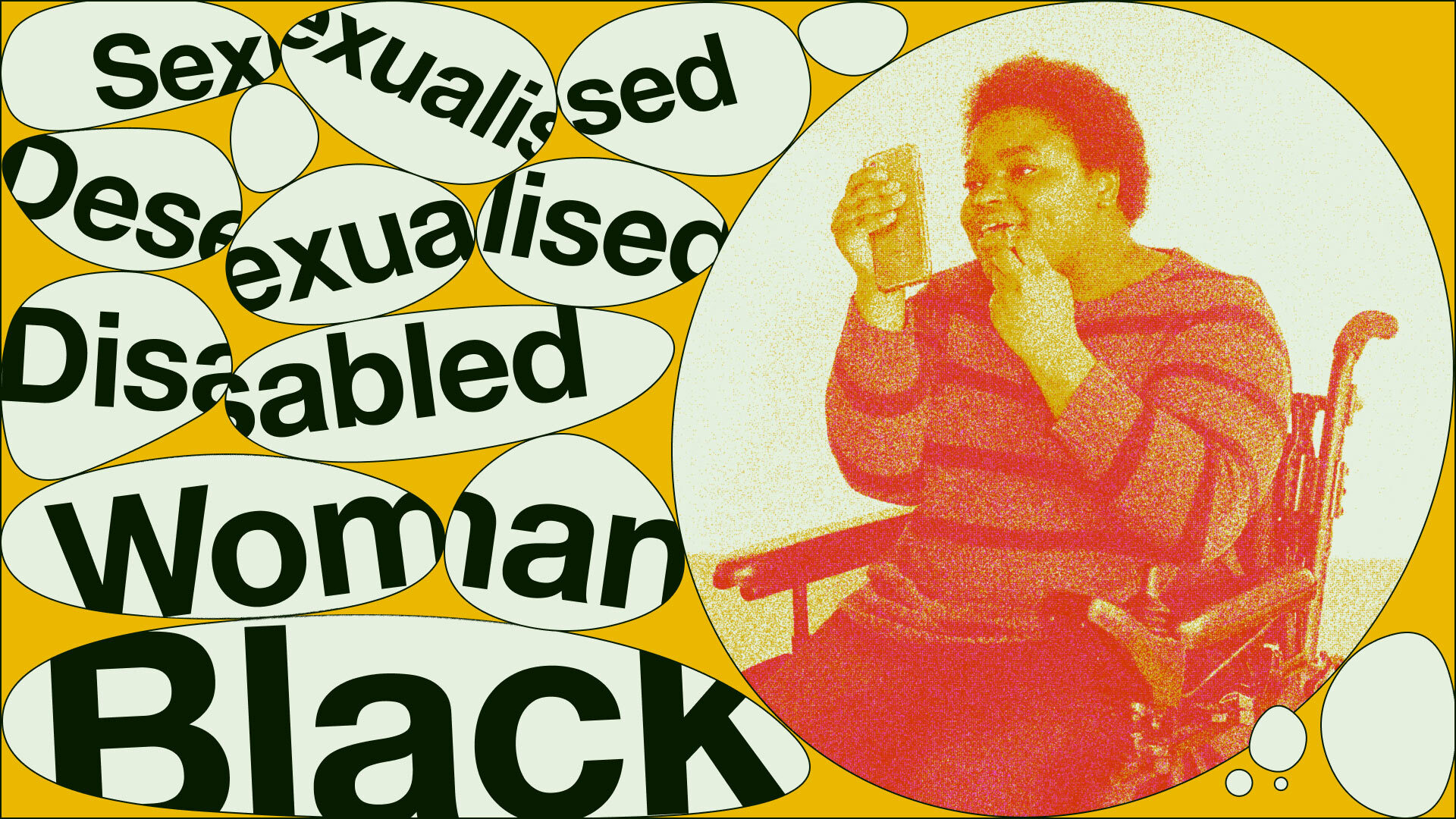Navigating Sex and Desire Is a Headfuck When You’re Black, Disabled and a Woman

Our ideas surrounding desire, flirtation, dating, sex and consent are all affected – and sometimes wholly determined – by external references. Representation plays a key role in how humans formulate ideas around individual sexuality and navigate the world as sexual beings. For Black, disabled women, there are no reference points. No depictions of a romantic glance across a crowded room; no movies with unrealistic, raunchy scenes; no coitus demonstrations, simplified for educational purposes; no chit-chats about sexual fantasies that include bodies like ours. Absolutely nothing. (And no, the obscure corner of the internet that features hyper-fetishised individuals, in pornographic videos, with grotesque titles does not count.)
Working under the name the Triple Cripples, to reflect the fact that we face three layers of oppression (race, gender and disability) we are two Black, disabled women – Kym Oliver and Jumoke Abdullahi – who use our Youtube channel, podcast, articles and talks to create much-needed representation for an invisible population.
When you introduce the constructs of sexuality, gender, ability and race, understanding sex becomes like navigating London’s backstreets with a treasure map from a fantasy novel. It’s the gif where Homer Simpson disappears into the bushes, backwards.
View this post on Instagram
So, what does it mean to be a Black, disabled woman, who is simultaneously invisible, hyper-visible, undesirable, hyper-sexualised, desexualised and infantilised by society… and navigating sex?
It’s complex, that’s for sure.
Like us, many folks have grown up absorbing patriarchal, misogynistic and racist ideas about sex and their role within it. They may have been taught that it is their duty purely to please and that their pleasure is meant to come from their selfless dedication to the task at hand. They may have thought that an orgasm is an urban legend, and that heterosexual sex (specifically) meant being acrobatic enough to make a man ejaculate.
But what if being an acrobat isn’t your ministry? What if you are queer? What if you need to approach sex differently? Or require assistive devices? What if you don’t look like the ‘beautiful’ and ‘sexy’ people you see in films, TV, Insta reels and magazines?
Societal ideas of sex and romance play a huge role in how we approach and process our interactions. Interpersonal and socio-cultural isolation can make Black, disabled women feel like they are having to re-invent the wheel when it comes to navigating sex, romance and dating. Meanwhile, figuring out what you want (or can have) in a world that acts like you should be grateful just to be alive throws an additional spanner in the works.
But the obstacles we face go beyond how we act and how we see ourselves: societal standards also play a gargantuan role in how others treat us. When it comes to sex, the power dynamic always favours those higher up the oppressor hierarchy – the non-disabled, the non-Black and cis men.
The odds aren’t just stacked against us – we aren’t even in the game.
Black women have historically faced, and continue to face, the opposing social oppressions of being considered undesirable, sub-human females and hyper-sexualised female objects. This paradoxical positioning was introduced to Jedi-mind-trick the masses into ignoring the everyday (and century-spanning) crimes of the individuals and nations involved in the terroristic kidnapping spree, dubbed the transatlantic slave trade.
This falsehood is why Black girls’ developing bodies are seen as intentionally lewd and Black women experience higher rates of domestic violence and sexual abuse. It is why enslaved Black women were used as living research subjects for gynaecology in the west, yet their descendants (the literal blueprint) have the worst modern-day outcomes in the same field (check the disparities in our pregnancy and birth rates). It is why our bodies, beauty and existence can be simultaneously mocked, ridiculed and animalised, and also divided into parts, coveted, mimicked, and monetised for success, fame and notoriety. Hello, lip fillers. Hello, cheekbone implants. Hello, box braids. Hello, “Sis”. Hello, “yaaas”. Hello, “Strong Independent Woman”.
Meanwhile, a brief look at social care cuts, the accessibility of Britain’s towns and cities, and the handling of any crisis makes it clear that society does not consider disabled folks to be whole and equal human beings.
As Black, disabled women, we have to deal with the desexualisation and infantilisation of disabled folks on top of everything we experience as Black women. Many struggle, for instance, to see Kym – a 6ft 1in, bountifully-endowed goddess of a human – as a woman or a desirable sexual being, because they are sitting in a wheelchair. The lack of conventional desirability opens the door instead to a weird fetishisation – but that’s a tale for another day.
Disabled women are also at least three times as likely to experience domestic and sexual abuse as non-disabled women. (It is fair to conclude, then, that Black, disabled women face the highest risk of all, yet as a marginalised group within a marginalised group, nobody bothers to collect data on our experiences.) .
Yes, sex is political. However, it is not all oppression and anguish – it is possible for us to have wonderful individual and shared sexual experiences as Black, disabled women. But because of our unique societal positioning, we have to kiss a lot more frogs, toads, rats, turds and scorpions to get there.
While there is no magic formula for escaping the quicksand of inequity, we believe that representation is the harbinger of ideological transformation. Our platform is dedicated to challenging societal structures and interrogating which people and which bodies we place on a pedestal. Those structures include sex: as a society, it is high time we decolonise and re-envision our ideas of beauty and desirability.
To read more about disability, see Novara Media’s previous focus, Disability: It’s Political.
The Triple Cripples are Kym Oliver and Jumoke Abdullahi, two Black, disabled women on a mission to highlight the narratives of an invisible population.


